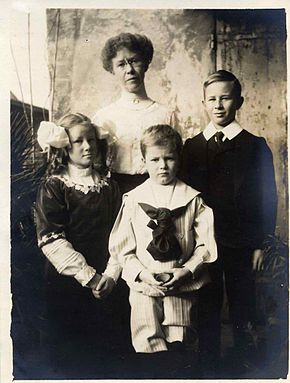Humphrey Cobb

Humphrey Cobb (September 5, 1899 – April 25, 1944) was an Italian-born, Canadian-American screenwriter and novelist. He is known for writing the novel Paths of Glory (1935),[1] [2] which was made into an acclaimed 1957 film Paths of Glory by Stanley Kubrick. Cobb was also the lead screenwriter on the 1937 film San Quentin, starring Humphrey Bogart.
Life[]
Cobb was born in Siena, Italy. He was the son of American parents, Arthur Cobb, an artist, and his wife Alice Littell Cobb, a physician. Cobb's parents sent him to school in England for his primary education and at age 13 he came to the United States to continue his schooling.
After being expelled from high school at age 17, he traveled to Montreal to enlist in a Canadian regiment. He served with the Canadian Army for three years during the First World War and fought in the Battle of Amiens.
Following the war, Cobb worked in the stock trade, the merchant marine, publishing, advertising, and the Office of War Information writing overseas propaganda.[3] He wrote Paths of Glory,[4] while employed by George Gallup at New York's Young & Rubicam advertising agency.
Cobb wrote a second less well received novel, None But the Brave, which was serialized in Collier's Weekly in 1938. From 1935 to 1940 he was employed as a screenwriter.
His Paths of Glory tells of the World War I era execution of three innocent people who were court martialed based on false information, to make a higher up look good.[5]
Death[]
Cobb died of coronary thrombosis at his home in Port Washington, New York on April 25, 1944. At the time of his death, he was an advertising copywriter for the New York firm of Kenyon & Eckhardt.
Family[]
He was survived by a widow, the former Annie Louise Hubbard, a son William, daughter Alice, and sister, Dr. Virginia Cobb.[6]
Notes[]
- ^ The phrase 'paths of glory' is a quotation from Thomas Gray's Elegy (1751): 'The boast of heraldry, the pomp of pow'r, // And all that beauty, all that wealth e'er gave, // Awaits alike the inevitable hour. // The paths of glory lead but to the grave.'
- ^ "A Talk With the Author of "Paths of Glory"; Humphrey Gobb". The New York Times. September 22, 1940.
- ^ Cobb, Humphrey (2010). Paths of Glory. New York, NY: Penguin Books. ISBN 978-0-1431-0611-1.
- ^ "Wanted: The Real Jim Thompson". The Los Angeles Times. May 5, 1991.
- ^ Bosley Crowther (December 26, 1957). "Screen: Shameful Incident of War; 'Paths of Glory' Has Premiere at Victoria". The New York Times.
- ^ "Humphrey Cobb, 44. War Story Author". The New York Times. April 26, 1944. p. 19.
External links[]
- 1899 births
- 1944 deaths
- 20th-century American novelists
- American male screenwriters
- Italian emigrants to the United States
- Canadian military personnel
- American male novelists
- 20th-century American male writers
- 20th-century American screenwriters